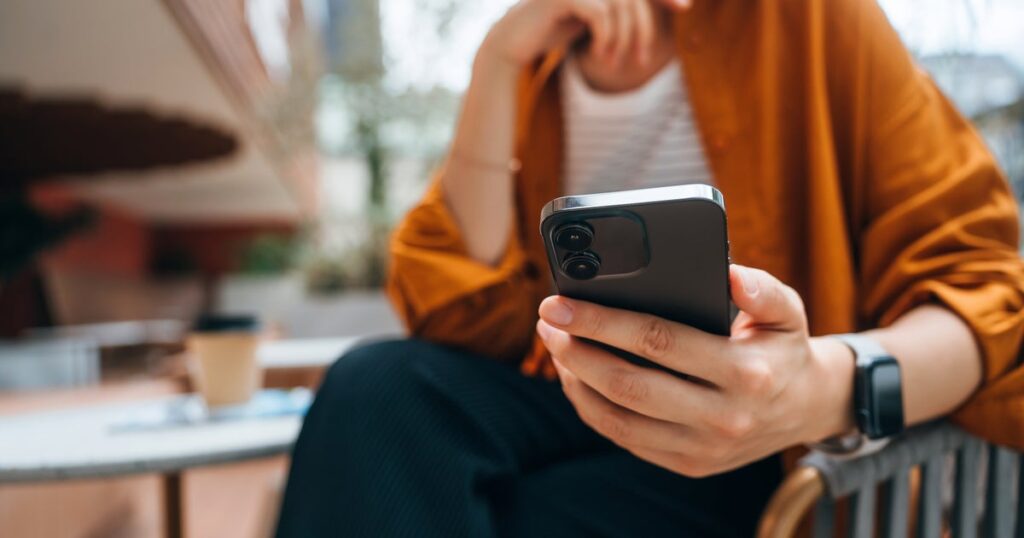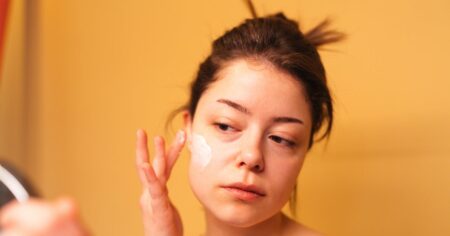You’ll be hard-pressed to find someone who feels better after spending hours and hours on their smartphone, whether they’re looking at social media, doomscrolling the news or searching for information.
The constant updates and email pings that infiltrate our tiny screens aren’t exactly a recipe for great mental health; research shows that excessive smartphone use is linked to higher rates of depression and anxiety.
On average, people spend four to five hours on their phones — and the definition of excessive phone use varies depending on who you ask, but tends to include behaviors such as feeling anxious when you can’t check your phone right away, using it when you shouldn’t (like while driving) and allowing it to disrupt social and work situations.
“[Excessive smartphone use] is both causing depression and the depression keeps us there. So it’s this cycle, right? It’s a feedback loop … happy people don’t scroll,” said Jenny Wise, a licensed marriage and family therapist, author of Mediatox on Substack and host of the podcast “Mediatox with Jenny Wise.”
“Now, if I’m unhappy or I’m feeling like I want to procrastinate, I want to put off whatever the hard thing is … my phone kind of makes me feel like I’m doing something. It also distracts me from realizing I’m not doing something,” she added.
But, after all that scrolling and silent social media comparison, you likely feel more depressed and anxious than when you got on your phone, Wise said — “but for that time I’m on it, I’m disconnected from that feeling.”
Below, experts share just how excessive phone use can both make you feel more depressed and cause depression.
Being on your phone too much can take away from your in-person interactions.
“Going down the road of depression, a lot of people get wrapped up in their phone use and actually begin to isolate and lose some of those social skills of just having a conversation with another person,” said Jim Houck, a licensed professional counselor with Thriveworks in Media, Pennsylvania.
If you’re constantly checking your phone when you spend time with others, you may lose some of the interpersonal skills we all take for granted, such as picking up on social cues, making eye contact and noticing body language, he said.
This can lead to discomfort when it comes to spending time with others, which may make you retreat to your home more often than usual. Or friends may stop inviting you out if you’re constantly on your phone and not chatting with others.
Being socially isolated can lead to loneliness, and those who deal with social isolation and loneliness are 25% more likely to develop depression, according to the American Medical Association.
skynesher via Getty Images
Your phone emits blue light, which can mess with your sleep and lead to mental health struggles.
It’s common to watch videos or scroll social media before bed, but this habit can disrupt your sleep, noted Houck. “That blue light that’s coming off the screen, that affects the ability to fall asleep, or to have good quality sleep when you’re able to fall asleep,” Houck explained.
Rebecca Robbins, a sleep scientist at Brigham and Women’s Hospital in Boston, previously told HuffPost that the blue light from screens has the same wake-up effect that the sun has on the brain and body.
How does blue light relate to depression? Research shows that not getting enough sleep can put you at heightened risk of depression. And it’s a cycle. Not being able to sleep can also be a sign of depression. So no matter what way you cut it, those late-night phone sessions aren’t helping your sleep, which also isn’t helping your mental health.
Your phone takes your mind away from the things you actually need.
Before smartphones, there were natural pauses in the day where we could check in on our “mental hygiene,” said Wise. This happened as folks waited in line at the store, commuted home from work or woke up in the morning. Now, those pauses that were free time for our mind are occupied by our phones, whether we’re scrolling, texting or Googling.
“If you weren’t answering the phone or getting on a computer, you had this space in your real life that actually kept your mind healthy … it was naturally there,” Wise noted. Without that time, you can’t address, or even understand, your needs.
“If you don’t have space for you and you alone and your mind, you’re not even going to be able to tell … are you hungry? Are you tired? Do you need to process some really frustrating situation that you just went through? Do you need to exercise?” Wise said.
“You will not have access to that information without space just for you, and you cannot find that space if your phone is present,” she noted.
That means that if something is triggering your depression, you may not be able to decipher what that trigger is if your phone is taking away from your brain’s processing time.
Even small reductions in phone use can help ease depression.
All of this doesn’t mean that you have to put down your smartphone for good. That likely isn’t realistic for most folks, anyway. But research shows that even small reductions in phone use, like just using it one hour less each day, can ease depression.
To spend less time on your phone, Houck recommends the “step down” method where you list out everything you use your phone for, such as banking, emails, texting, photos, list-making, morning alarm clock, shopping, and eliminate a few things so you don’t reach for your phone as often.
For instance, you could get a notebook to make your to-do lists instead. Or you could get an old-fashioned alarm clock instead of using the alarm app.
You can also create phone-free spaces in your home, said Wise, who recommends trying this in the living room and bedroom. This way, when you are in these rooms, you won’t be tempted to shop online or check your work email.
Quitting your smartphone doesn’t mean that your depression will instantly be gone, but Wise said folks tend to find more joy, overall.
“There is this illusion that depression and anxiety are something that we could erase from our lives,” Wise said. As folks disconnect from their phone, “I think they become more named things. I’m depressed about this, or I’m anxious about this … things start to find their category, but I’m overall just enjoying and loving my life more,” noted Wise.
That time allowing your mind to wander can also give you clarity about things that need to be dealt with so they don’t fester.
“There’s never not going to be a hard thing in your human life,” Wise said.
But if you’re able to name your depression and anxiety, instead of distracting yourself from it, you’ll be able to do what you need to move forward and feel better.
Read the full article here








